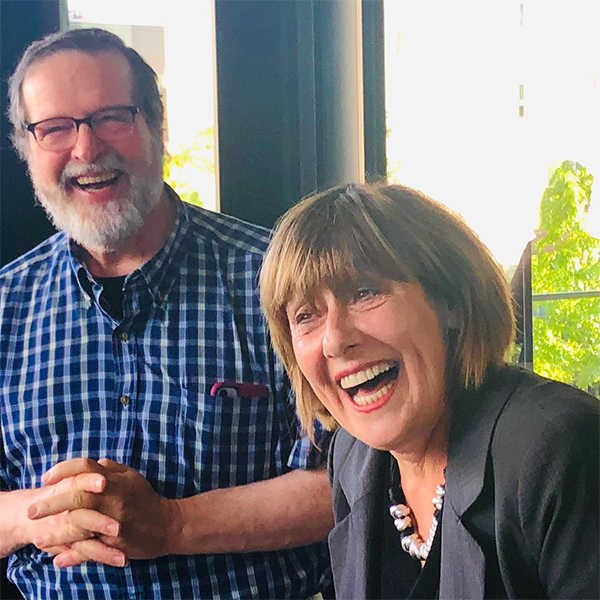Associate Dean Sandy Friedlander Retires After 34 Year Career at Drexel
By Tom Durso
September 1, 2021
Alexander Friedlander, PhD – Sandy to his colleagues and friends – chuckles as he looks at the wall calendar above his desk on the fourth floor of MacAlister Hall.
“It is a little out of date,” he concedes. “I suspect that's not the only one in this suite that is stuck on March of 2020.”
Calendars may have stood still during the 18 pandemic-ravaged months that offices sat empty, but time – and University life – marched on. And despite working remotely for the duration of the shutdown, Friedlander didn’t miss a beat in his tireless efforts in support of students and faculty as the College’s associate dean for undergraduate education. Now, he has returned to campus to clean out his office. Friedlander closes the door on a 34-year Drexel career with his retirement on August 31.
“I have a lot of good memories,” he says. “There have been some wonderful people that I've had the pleasure of working with along the way. There were a lot of good people in the College, a lot of good people in leadership, a lot of good people amongst the faculty.”
Friedlander arrived at Drexel in 1987, on the heels of earning his doctorate in rhetoric from Carnegie Mellon, when he was hired as a writing researcher in what was then the Department of Humanities and Communications. He began teaching writing and communication to undergraduate and graduate students and went on to hold administrative positions in the Department of Humanities and Communications, the Department of Culture and Communication, and the Department of Communication, where he served as interim head for 2 years. For a time during his service as assistant head of Culture and Communication, he also served as a half-time associate dean for undergraduate education.
 Sandy Friedlander with former Dean Norma Bouchard in June 2021.
Sandy Friedlander with former Dean Norma Bouchard in June 2021.
“After about two years, we realized this is crazy,” Friedlander says. “I can't be assistant head of a big department and associate dean. So I became associate dean full-time in 2008.”
In that capacity, Friedlander oversaw undergraduate curriculum for the College and also sat on a wide range of University committees. Professor of Physics Nicholas John DiNardo, PhD, served for over a decade as associate provost for academic affairs, and in that capacity he interacted with Friedlander frequently. DiNardo credits his former colleague with leading “innovative initiatives that have advanced the education and success of not only the College’s majors but of thousands of students who take courses from CoAS and may enroll in dual majors and minors within the College.”
DiNardo adds, “Sandy is truly a role model for academic administrators and faculty in his tireless and unselfish work in advancing Drexel’s academic mission. Sandy has had pivotal roles in curriculum design and development – including his vision and leadership in developing bachelor of arts programs and accelerated programs leading to professional degrees – in advising, and in faculty/staff development.”
Indeed, Friedlander’s important role in curriculum development goes back to the creation of CoAS itself, in the early 1990s, when the College of Science and the College of Humanities and Social Sciences merged.
“We didn’t have BAs,” he says. “We only had BS degrees. How could it be a College of Arts and Sciences if you’re prominently sciences, as it were? Imagine, we used to have a BS in literature. We created the BA degree, which was not as easy as it seems, because our charter with the state at the time only allowed us to create BS degrees. So we had to go through a huge amount of work.”
Famously modest, Friedlander is prone to turning conversations away from himself in favor of coworkers. Colleagues current and former, though, have no qualms praising him for his good humor, collegiality and dedication.
“Sandy has always been there for me, always helpful, always quick to respond, and always kind,” says Rogelio Miñana, PhD, department head of global studies and modern languages and vice provost for global engagement. “I am deeply appreciative of Sandy's reliability and kindness.”
Devon Powers, PhD, now an associate professor of advertising at Temple University, was a faculty colleague of Friedlander for eight years.
“I have great affection for Sandy and found him to be a patient and sage mentor – one of the most impactful I have had during my career and especially during my time at Drexel,” she says. “I am sure I am not alone in thinking this because Sandy is the consummate teacher and team player. He has been a tremendous asset to Drexel, and I know he will be sorely missed.”
Susan Bell, PhD, professor of sociology, recalls that even before she arrived at Drexel, a colleague in the department told her she had put Friedlander’s phone number on her speed dial.
“The first week I was here, when one of the Sociology faculty went missing – students couldn’t reach them – I discovered exactly what she meant,” Bell says. “Sandy is so wise. His wisdom and experience guided me through the twists and turns of being a department head at Drexel, which is a unique experience indeed.”
Friedlander says he’ll miss the people of CoAS the most.
“I will really miss meeting the first-year majors in Communication each fall in UNIV 101 and helping them get started on their journey towards their degrees,” he adds.
With his newfound free time, he plans to catalogue his book collection, which he estimates at between 1,500 and 2,000 volumes, see his grandchildren, and travel, especially to his native South Africa, where his mother still lives.
Asked what advice he has for his successor, Scott Warnock, PhD, he smiles.
“Take a deep breath,” Friedlander says. “And realize that this, too, shall pass.”